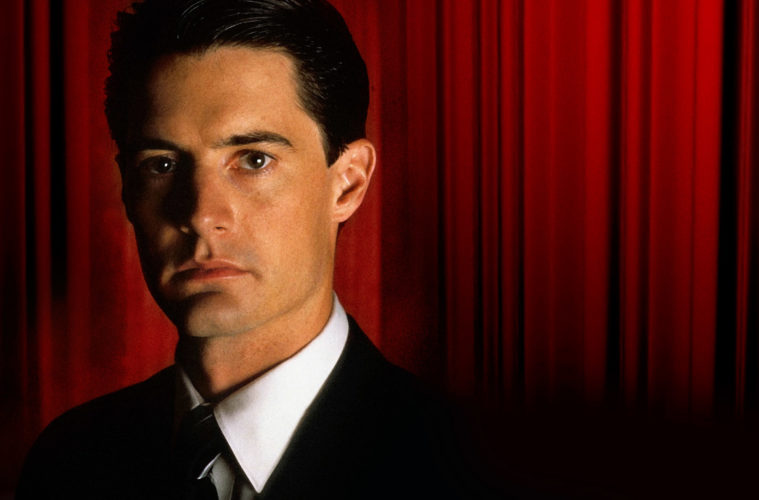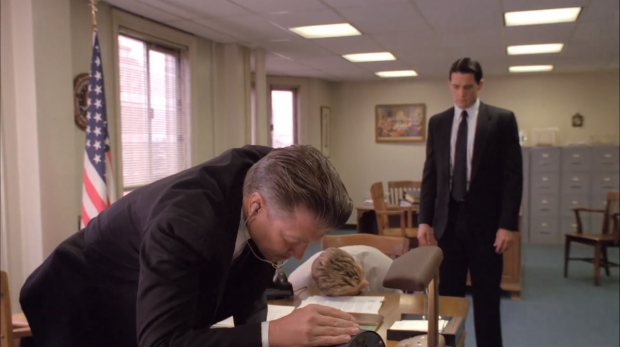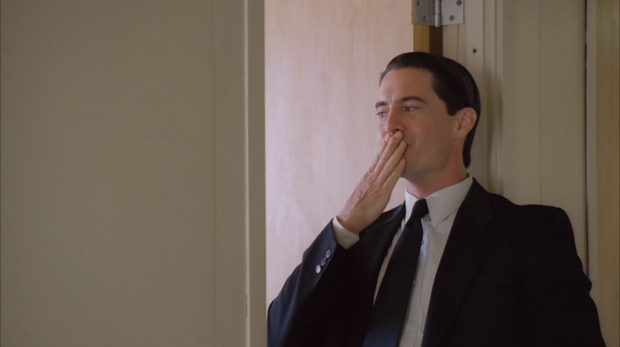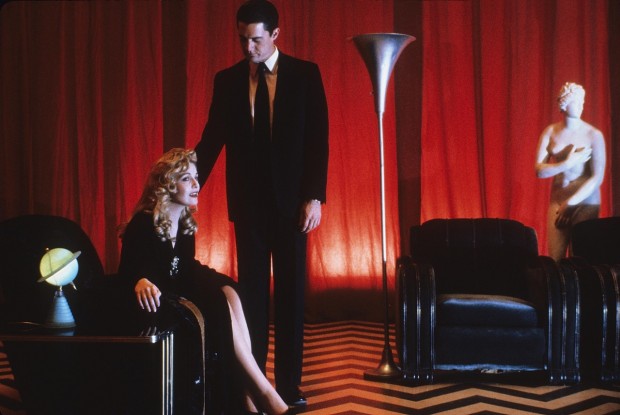Three disclaimers before moving forward:
1. Because this has been written by someone who simply cannot discuss Twin Peaks from a newcomer’s perspective, the following contains numerous spoilers for both the 30-episode series and its prequel / sequel film, Twin Peaks: Fire Walk with Me.
2. Those who’ve not had the fortune of viewing these scenes would be well-off picking up the set for themselves or, if they must, comb over a thorough recap to get some lay of the land. But if you’ve waited this long, why compromise what’s finally available with the words of another?
3. We’re gonna talk about Judy; we’re not gonna keep her out of it.
The wealth of scenes excised from David Lynch’s Twin Peaks: Fire Walk with Me have plagued a very dedicated fandom for more than two decades, in time only looming larger and larger over the legacy of both the 1992 picture and its landmark TV predecessor. With some very minor exceptions — grainy behind-the-scenes photos, or the opportunity to envision what might be by combing through a massive screenplay — pleas and wishes have been made to no avail whatsoever. Regardless of where you stand on this divisive feature, it’s easy to now recognize that ancillary content as a millstone — in this fan’s estimation, one that no domestic-abuse drama already driven by such honesty, brutality, and passion could possibly deserve.
If you’ve felt the unique pain of this anticipation, it should go without saying that a recent trailer promising some 90 minutes of these scenes — possibly all the “extra” material that had been filmed, judging by this comprehensive breakdown of Lynch and Robert Engels’s original script — offered a Peaks-related thrill unlike anything I’d experienced in a very long time. On the surface, there was a fanboy-ish indulgence much in the vein of reactions I’m quick to criticize; deep down, however, the sudden (and unexpected) sating of a desire I’d had pent up for years. As I said to one friend when the first preview hit in May, to finally have a glimpse at this near-mythical footage, however piecemeal the presentation, was akin to seeing a long-recurring dream slowly, vividly come to life.
Thus it should also be understood that watching the full collection — sold under an aware-of-its-legacy title, The Missing Pieces, and as the main attraction of the recently released Twin Peaks: The Entire Mystery Blu-ray set — proved an absolutely disorienting experience that rendered any traditional assessment nearly impossible. Anyone who cares about the show, the film, and what that long experience encompasses will also find it too overwhelming to make for a passive experience. Judging by the litany of responses that have emerged in recent weeks, people want to talk about it. We’ve seen numerous summaries of these sequences and, over the years, enough has been done to tackle the strange beast that is Fire Walk with Me, leaving few new angles. But there’s at least one that hasn’t been mined as much as expected: assessing The Missing Pieces as a deepening of the Twin Peaks legacy and a key to some finer understanding of the series, its big-screen counterpart, and the beautiful frustration inherent to mad love for a long-gone cult enterprise.
Nestled in a strange space between lavish cutting-room-floor salvation and entirely new feature, it’s as hard to pin down as almost anything in the Lynch oeuvre. A big contradiction defines this experience: its chronology runs parallel to Fire’s narrative, yet veers between general coherence and total bemusement for being divorced from any real context. It seemingly presumes we’ll be watching with full knowledge of already-seen events, thus permitting an indulgence in the unexplained that, even for the director, is especially palpable, the gateway to a Lynchian expression on par with some of INLAND EMPIRE‘s headier segments. Given their decades-old date and the unlikelihood of any follow-up, the ripples created at any single point may never cease undulation.
While we may have a better grasp of what Phillip Jeffries (a southern-accent-donning David Bowie) was up to before and after his beguiling one-scene appearance, the snatches of new dialogue open possibilities we may have never have even thought a part of Twin Peaks‘ world. (Excepting, that is, the mystery of Judy, who Jeffries had famously refused to “talk about.” The Missing Pieces expand: he does, in fact, talk about her just a bit, and in doing so [somewhat] clarifies the significance of her small role in this series. How amusing that it only took a few extra seconds and some additional sentences to dissipate a 22-year-old mystery.) The more expansive, longer portions are by and large a more open-and-shut affair, sometimes a longer road toward the same dead ends — e.g. a Jeffries companion wherein BOB and The Man from Another Place’s negotiation is extended significantly. The pure intensity of this sequence is jaw-dropping — seen on Blu-ray, the modern-day AV quality brought to this long-lost item resurrects Frank Silva‘s terrifying creation in particularly fierce form and may be as strong a case for HD home presentations as any disc I’ve encountered.
The show’s final episodes hinted, somewhat obliquely, that what we’d been watching all this time was not exactly an “original” series of events — rather the latest trip around a circular construction that its characters are destined to repeat over and over. Richer though it may grow with time and subsequent revisits, Fire Walk with Me continues to frustrate in at least one respect (even if only slightly and not enough to significantly detract): how it complemented this specific conceit without diving a smidge deeper, leaving certain pieces (e.g. the return of Annie Blackburn) dangling. It wasn’t meant to be this way, of course: the final two items, set “Some Months Later,” feel as if they’d begin either a third season or second film. That we’ll probably get no more is positively maddening, and Cooper’s scenes, both pre- and post-series — this former setting bringing a one-person dialogue with Diane, whose existence we still can’t verify — are terrific, albeit emblematic of the enticing problem at this franchise’s center.
Recall Agent Cooper’s investigative philosophy: “In the heat of investigative pursuit, the shortest distance between two points is not necessarily a straight line.” Instead of breaking Twin Peaks’ circular trajectory into a straight line, everything now bolstered by clear nascent and concluding points, these additional segments mostly expand the circumference — an effect that’s now the closest we can come to solving an unsolvable puzzle.
Since Peaks fandom is relatively large, numbers-wise, and has much to work from, speaking in terms of content — plot, mythology, tone, cast, formalism; it remains one of the most well-mounted series in TV history — it seems impossible that any two viewers will walk away with the exact same feelings. One effect that’s likely to linger with some consistency is an enhanced understanding (perhaps outright appreciation) of Fire Walk with Me, a picture that, despite its recently burgeoned reputation, some corners continue to malign for its supposedly errant shift away from beloved series regulars. If, indeed, I cannot reasonably assume how these stung faithful will feel about the scenes themselves — save for the laugh elicited be Nadine’s three-second appearance, or the familiar groove of a secluded nighttime date between Ed and Norma — I have regardless noticed that some are coming around to the purpose behind Lynch’s 1992 film. In short: nice though these scenes may be, it only highlights how unnecessary the inclusion of their likes is to Laura Palmer’s story. They take us down memory lane and perhaps nowhere else, but when we haven’t seen them in so long — and when their place in Fire Walk with Me feels all the more like fan service once seen — their brief return provides the as-intended comfort without infringing upon a stronger narrative.
Which could speak to why the only scenes with any sense of stagnation involve Laura herself. Shedding light on hidden corners (Jeffries, Diane, the post-series sequences), even if they ultimately prove tangential, enlivens Peaks’ sprawling saga more than a different angle on what’s been established through Fire Walk with Me‘s pre-existing narrative. Any story that’s been experienced multiple times — through the lens of those who knew her, through the lens of her final seven days, and, if you’re a particularly adventurous fan, on the pages of her secret diary — can be recounted beat for beat, “missing pieces” or not. Having an additional peek at everything may fail to account for the odd structural choices Lynch made in Fire Walk with Me (this, despite Chester Desmond and Sam Stanley’s extra material pleasing just fine), but more sex, more drugs, and more fights with loved ones mostly stress how Lynch first focused his attention in 1992, and having not seen the film in nearly four years was hardly an issue, context-wise, when its portrayal of an incestuous nightmare proves core-shaking as is. This restoration of the excised has a way of bolstering the retained.
The Missing Pieces are undoubtedly an essential part of Twin Peaks’ legacy, but perhaps not to the effect voracious fans had anticipated. Where one scene has a way of expanding — e.g. the Log Lady’s most human moment is briefly seen here, and acts as both a supplanting of and complement to one of her only personable appearances in the original series — another serves as a contraction, forcing the question of where things might have gone if box-office returns were more fruitful. If this collection doesn’t exactly leave us at square one, we’re still mostly unsure as to how much can be “applied,” mystery-obsessive-wise. How nice. Though when the show many love with such passion had never even intended to solve the mystery at its dark heart, why hope to have our perceptions reconfigured now? Among the litany of pleasures offered by The Missing Pieces, its greatest may be a vindication of original intent.
Twin Peaks: The Entire Mystery is now available on Blu-ray.




